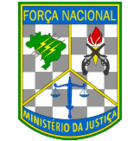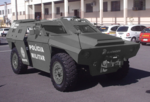National Public Security Force
| National Public Security Force Força Nacional de Segurança Pública | |
|---|---|
 | |
| Abbreviation | FNSP |
| Agency overview | |
| Formed | 2004 |
| Jurisdictional structure | |
| Federal agency | Brazil |
| Operations jurisdiction | Brazil |
| General nature | |
| Operational structure | |
| Headquarters | Brasília, DF |


The National Public Security Force (Template:Lang-pt) was created in 2004 and with headquartered in Brasília, in the Federal District, as a joint cooperation of various Brazilian Public Safety forces, co-ordinated by the National Secretariat of Public Security (Template:Lang-pt - SENASP), of the Ministry of Justice. It is an agency that was created during the administration of President Luiz Inácio Lula da Silva, a concept developed by then Minister of Justice, Márcio Thomaz Bastos.
Command
The Secretary of the SENASP, Police Commissioner of the Brazilian Federal Police, Luiz Fernando Correa, is in overall charge of the Force, while the Colonel of the Military Police of Rio Grande do Sul, Aurélio Ferreira Rodrigues, has operational and direct control of the force.
Training
The National Force is composed by men of the Brazilian Military Police of the various states of Brazil, in coordination with the Secretary of Public Security of each different Brazilian state.
Law enforcement officers receive initially 100 hours of further education, divided in ten days of training. They are classes in: human rights, control of civil riots, ostensive policing, crisis management and shooting techniques.
BEPE
The BEPE or Batalhão Especial de Pronto Emprego (Quick Deployment Special Battalion) is the elite unit of FNSP, is headquartered in the satellite city of Gama, in the Federal District, and soon will also have another unit in the city of Rio de Janeiro. Its effective training with elite units of Brazil and abroad, is suitable to be used in patrolling or police special operations anywhere in the country, was established by the Ministry of Justice in order to become the leading and best-trained troops Brazilian police, and to act in emergency situations in public safety, when the law enforcement agencies state request federal intervention in an emergency. Urgency, that can be quickly answered, as his quota is effective and not demobilizable, remains in readiness to meet by Situation critical in public safety.
Performances
On different occasions, the National Force was called in the state of Espírito Santo as well as in the state of Mato Grosso do Sul, primarily to help containing rebellions inside prisons. On another occasion, the federal government offered to send the National Force to assist the state of São Paulo against acts of violence organized there, in 2006, again by prisoners against the state public safety forces, but the federal government offer was refused by the state government, as the state claimed control over the prisoners.
The governor of the state of Rio de Janeiro, Sérgio Cabral Filho asked for support from the National Public Security Force back in 2007 when the state suffered from a wave of attacks by several criminal factions. The Federal Government agreed to send a contingent of about 500 men and 52 vehicles to patrol 19 critical points within the state, mostly the favelas' areas.
The NSPF was called into action in the states of Santa Catarina, Minas Gerais and Bahia in 2013, and in Pernambuco in 2014. In these cases, the force provided stricted security measures in these states. It reinforced local police work in Teresina, Piaui, in 2015.
Individual Weapons and Equipment
- FN FAL and Para-FAL battle rifle
- IMBEL MD97 Assault rifle
- IMBEL M1911 pistol Pistol
- Taurus PT92, Taurus PT100, Taurus PT 24/7 Pistol
- Heckler & Koch MP5 Submachine gun
- Heckler & Koch UMP Submachine gun
Vehicles

| Model | Manufacturer | Notes | Photo |
|---|---|---|---|
| Nissan Xterra | Nissan | Patrol car | 
|
| Nissan Frontier | Nissan | Patrol car | 
|
| Fiat Ducato | Fiat | Utilitary | 
|
| Mercedes-Benz Sprinter | Mercedes-Benz | Utilitary | 
|
| VBL Gladiador | Inbrafiltro | Armoured car | 
|

